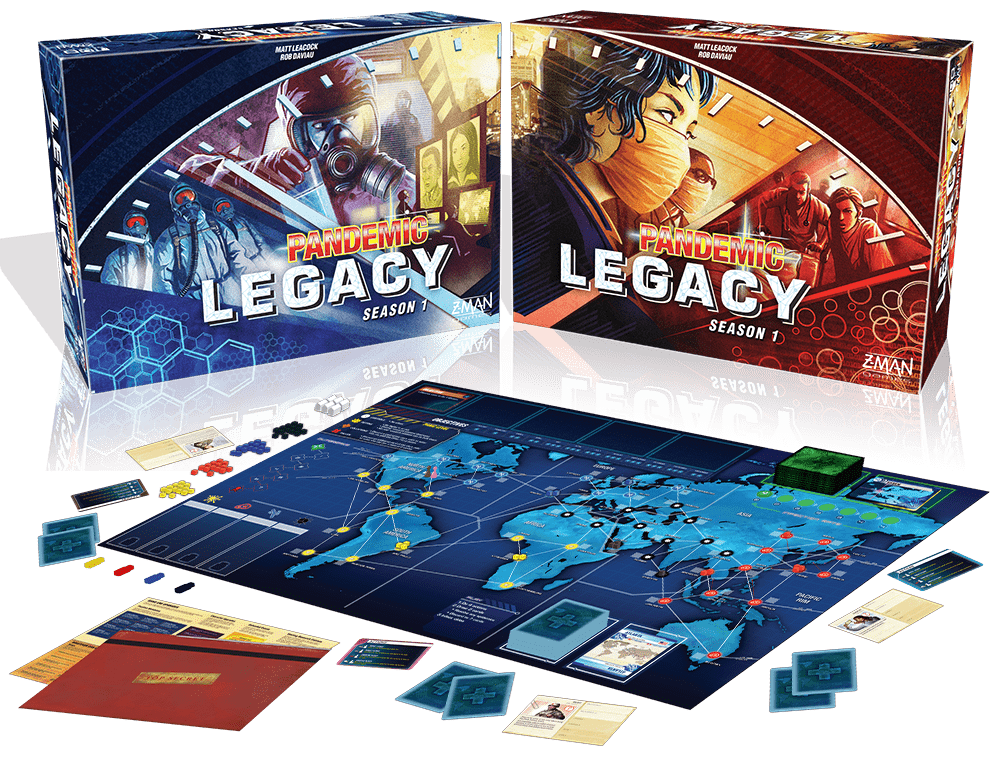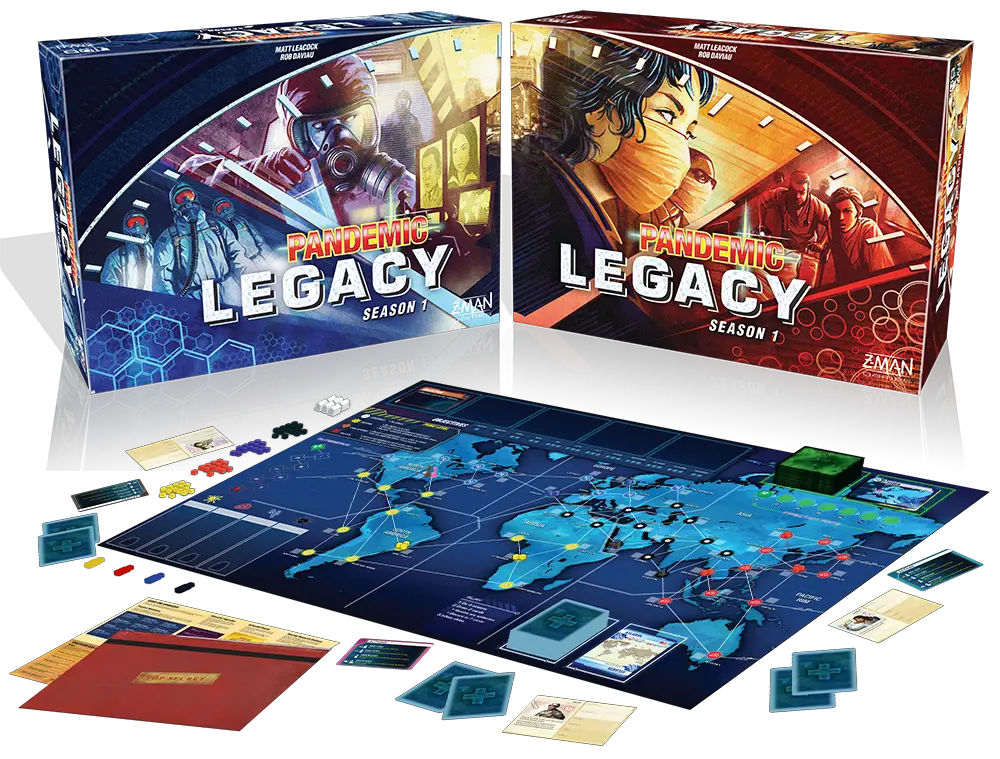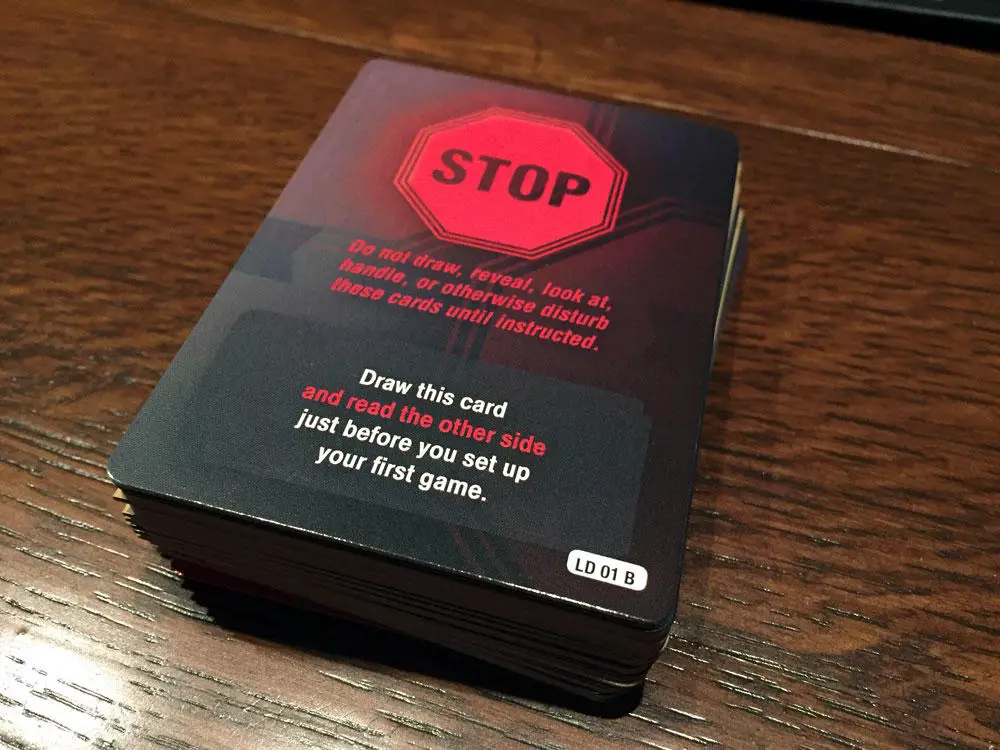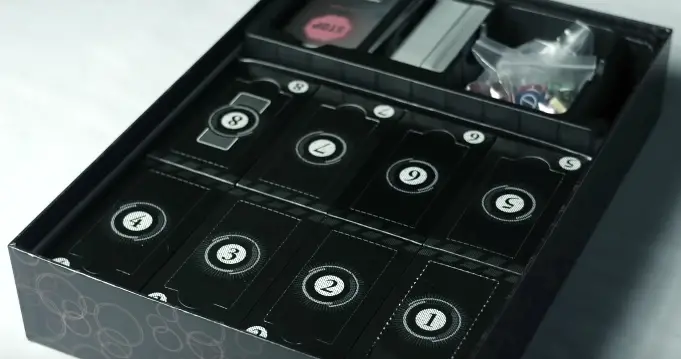Pandemic Legacy isn’t my first experience with a legacy game. Most people familiar with the genre probably played a legacy version of Risk. It’s intriguing, the idea of having a progressing game world where a region of the map can be wiped out, forever influencing games in the future. But the pessimist in me remembers my frustrating experience with Descent, a game I wish to never play again. Descent shares many features that have me intrigued by Pandemic Legacy.
Although Descent had some cool RPG systems that made upgrading your hero a cool process, but there were just too many flaws in the core mechanics to keep me interested in the game. Pandemic Legacy, however, is built upon a game that I already love. Matt Leacock’s modern classic, Pandemic, rated at #22 on our top 100 list for good reason. Needless to say, I was excited to give this game a run, and the results did not disappoint.
Pandemic’s Cooperative Foundation Stays Intact
If you’re not familiar with the base game, then you’ve been living under a rock. The vanilla Pandemic experience is one of the more solid cooperative games you can find out there, and it’s probably a good idea to play a few rounds of that before you jump into the legacy’s campaign. Luckily, Pandemic Legacy can play the vanilla version of Pandemic, so make sure you’ve got the game’s basic systems down before you jump into a campaign where your decisions are often important and permanent.
The base gameplay of Pandemic Legacy doesn’t stray from the systems you’re used to in Pandemic. The game is played cooperatively with up to four total players. You are a global response team in charge of thwarting a sudden breakout of diseases around the world. You and your team of specialists scan the globe to staunch the spread of disease by “treating” cities to remove infection cubes and eventually cure diseases by turning in five cards of its corresponding color.
There are four different diseases that will originate from four different regions, represented by four different colors. When one city has to add a 4th infection cube, an “outbreak” occurs, sending more infection cubes to all cities connected to it. This can create a devastating chain that can ruin the game, which means that the game looms with tension as a couple bad card draws and all of humanity dies a wheezing, miserable death. You could say that the stakes are high.
Stopping there, the game is one of the better cooperative games on the market. Games last about an hour, and coordinating your strategy to save the world with a group of friends is a blast. You’re always trying to think a few turns ahead, but there’s so much that can change with the turn of a card that you rarely feel like you’re safely coasting.
12 Months to Save the World
The legacy edition of this game adds many layers to Pandemics addictive gameplay foundation. Rather than finding your cures and finishing the game, the global outbreak must be resolved over the course of one year, with each play session representing one month. If you the game reaches one of its lose conditions (too many outbreaks, depleted draw deck, etc.), players will have a second opportunity to play that month. Winning a month, which is based on win conditions that seem to constantly change from month-to-month, means that your team gets a special perk that carries over to the next month.
A perk isn’t very often a huge swing in your favor, but with how close some of these games end up, that slight advantage can feel like a big boost. In addition to these small carryovers, the characters you use will change as the game progresses. Game-end upgrades give players options on how they want to improve the game’s characters, building permanent research stations on the board, or make improvements to your disease treatment, essentially weakening a disease for the remainder of your campaign. Tearing up cards and slapping stickers on your game board will make your insides twist, but it’s the way it’s supposed to be. Deep breaths.
What surprised me most about Pandemic Legacy was its storytelling. At the end of every game you’re opening new boxes, unveiling twists and rule changes/additions for future games. Much like the feeling of each individual play through, Pandemic Legacy keeps you on edge. Every time you tear a piece of cardboard, revealing a new secret, the game could take a drastic turn. Sometimes it’s just a new set of potential upgrades for your characters, other times… nothing will ever be the same.
Pandemic Legacy has good enough build quality, although there isn’t much changed aesthetically from the games earlier iterations. You start with a familiar set of pieces and then the game constantly builds on that foundation, adding new playable characters and other usable pieces. The game isn’t all that pretty, but everything functions the way it should and the information is clear enough.
This is the game I’ve been seeking for years and didn’t realize it. Everything feels important. Unlike my previous run-ins with a legacy game like this (I hate you, Descent), your choices seemed to make a real difference in the long run. If you’ve got a couple of friends to play with, the discussions of the game themselves are worth the relatively high price of entry.
Is It Worth It?
I simply cannot recommend this game enough. It’s some of the most fun I’ve had playing table tops in years. If you have roommates that play games like this, buy this game yesterday. Providing no less than 12 play sessions, Pandemic Legacy is well worth the $70 price tag attached to it. This game is as full of value as it is surprises, and you’ll be clamoring to start up another round as soon as one finishes. With even one or two friends that can commit to playing along with you, Pandemic Legacy is going to feel like a unique, addictive cooperative experience.





